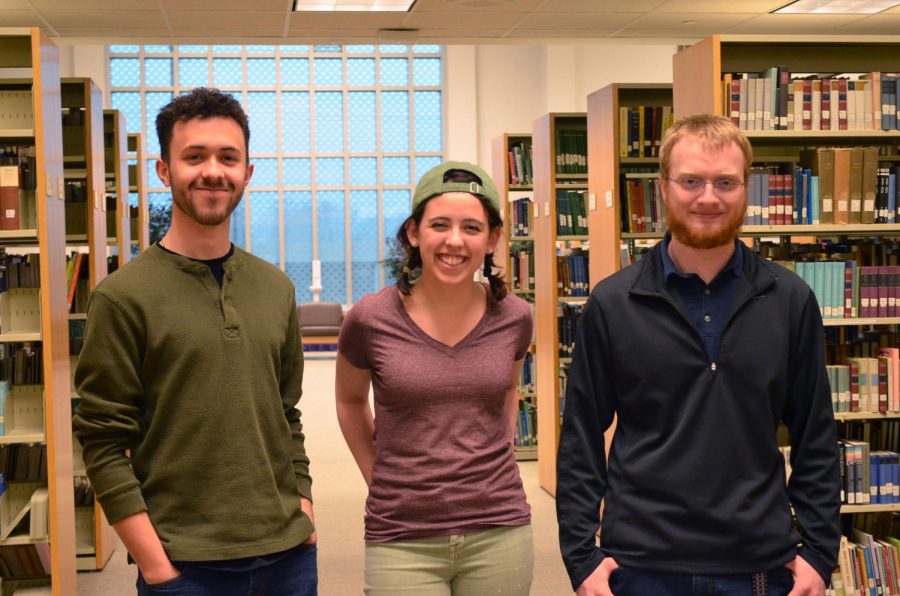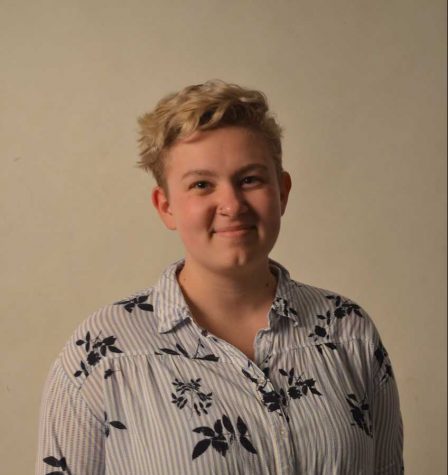Winona Prize winners announced
The three Winona Prize winners left to right: Sophomore Walker Larson, junior Emma Cavanaugh and sophomore Eric Leith. The contest is sponsored by an anonymous donor and each winner receives a $1500 scholarship.
February 21, 2018
In its third year in practice at Winona State University, the Winona Prize in Creative Writing has three new winners this year: Emma Cavanaugh for poetry, Walker Larson for nonfiction and Eric Leith for fiction.
The first-place winners of each category are awarded a $1,500 scholarship and their work is published in Winona State’s annual literary magazine, Satori. All students at Winona State will be able to read winning pieces, as well as others submitted to the Satori when it is published.
Contestants are required to be undergraduate students enrolled full-time and in good standing at Winona State. While students from all majors are encouraged to apply, contestants must have completed a creative writing course at Winona State. Students can submit to all three categories if they wish.
After submitting their writing, contestants must wait for members of the English Department to review their work, then send the work onto the judges.
This year, visiting authors judged each category; Heid Erdich judged poetry, Kent Cowgill judged nonfiction and Keith Lesmeister judged fiction.
Cavanaugh, a senior English-Writing major, was in a poetry class last semester, which is where she was encouraged to submit to the contest.
In Cavanaugh’s poetry class last semester, the class went on a journey down the Mississippi River on Winona State’s water classroom, the Cal Fremling. This was where she was inspired to write her poem.
“Our assignment was to write river poems, so I took a ton of notes on everything I saw and felt and thought, and later put it together into a poem. I tried to use long lines to mimic the flow of the Mississippi,” Cavanaugh said. “The funny thing is that I was really dissatisfied with how it turned out, and it became the poem that I kept returning to and rewriting throughout the semester.”
Erdrich judged Cavanaugh’s poem.
“This poet has excellent control of language and syntax, revealing a distinct vision of place,” Erdrich wrote. “I particularly enjoyed Cavanaugh’s word choice, and the overall effect is a visual portrait of the river informed by the social aspects of its history and something deeper still, the life of the landscape and riverscape. Quite beautiful.”
Larson, a senior English-Writing major, first found out about the contest through posters around campus but was encouraged to submit from his English professors.
“Seeking to get recognition and publication is just a natural part of the process of trying to be a writer,” Larson said. “My dad is also a writer and has told me about people he knew in grad school who literally plastered their office walls with rejection letters, like wallpaper. It’s just part of the game. You keep submitting to things, keep getting rejected, but when you’re serious about writing, you don’t give up.”
Larson submitted to all three categories both this year and last year, and he won for the first time this year for his nonfiction work.
“This year’s winner is a vivid take on the joys and frustrations of fly-fishing in prose that’s as supple and graceful as the trout it describes,” Cowgill wrote. “Larson has written an angling narrative that glides seamlessly into deeper reflections on life goals, father-son bonding, and the ‘level of unexpected reward that seems to flow disproportionately out of our feeble efforts’ to achieve a dream.”
Larson originally wrote the essay for his Creative Nonfiction writing course and was inspired by one of his hobbies, fly-fishing.
Leith, a junior global studies and mass communications major, was initially informed of the contest through a creative writing class with Elizabeth Oness.
“At first I sort of brushed off the contest as something that wasn’t quite up my alley,” Leith said. “But then Dr. Oness sent us all an email reminding us to submit, so I figured it would be better to try and fail than to not try at all.”
Leith was the first non-writing related major to win this award, but the judges thought his piece stood out above the rest.
“What I found most compelling about this aspect was what I find compelling in most fiction I seek to read: how a character’s interactions with a complete stranger might translate to a better understanding of him/herself and their own relationships,” Lesmeister said. “Lastly, I appreciate the risk taken in this piece with the use of ‘I love you’ between the father and son. So often those words, especially between boys or men, are said with a tone of irony or joking around. In this case, it was a stripped-down, real, believable honesty that I connected with emotionally.”
This contest is made possible by an anonymous donor dedicated to encouraging Winona State students in their writing and literary pursuits. Oness, an English professor in charge of running aspects of the contest, said this year is the year with the most submissions so far.
“We have such a great creative writing program here,” Oness said. “Students are realizing what a fantastic opportunity this is for them and are spreading the word.”
“Writing is an interesting thing to me, where even if you don’t necessarily study it, your perspectives and background can still help you create something interesting,” Leith said.
Oness hinted that additions to the contest may be added in the future.
“We are talking to a faculty member here who is a talented playwright to see if students submitting screenplays would be a viable option,” Oness said. “We want to make sure we can open up many areas of writing for students.”














































